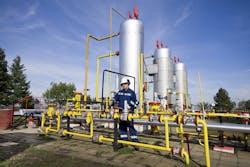Pennsylvania Governor Tom Wolf has announced new rules on methane emissions that will apply to natural gas well sites, processing facilities, compressor stations and along pipelines.
Methane, the primary component of natural gas, is a more potent greenhouse gas than carbon dioxide. Studies have shown that the oil and gas industry accounts for around a quarter of all U.S. methane emissions.
Pennsylvania will reduce methane leaks and emissions during development and gas production, processing and transmission by requiring leak detection and repair (LDAR) measures, efficiency upgrades for equipment, improved processes, implementation of best practices and more frequent use of leak-sensing technologies.
The four-point plan announced by Gov. Wolf is intended to:
- reduce leaks at new unconventional natural gas well pads by developing a new general permit for oil and gas exploration, development and production facilities. This requires Best Available Technology (BAT) for equipment and processes, better record-keeping, and quarterly monitoring inspections.
- reduce leaks at new compressor stations and processing facilities by revising the Pennsylvania Department of Environmental Protection’s current general permit, updating best-available technology requirements and applying more stringent LDAR measures and other requirements to minimize leaks. A new condition will require the use of Tier 4 diesel engines that reduce emissions of particulate matter and nitrous oxide by about 90 percent.
- reduce leaks at existing oil and natural gas facilities by developing a regulation for existing sources for consideration by the Environmental Quality Board.Reduce emissions along production, gathering, transmission and distribution lines by establishing best management practices, including leak detection and repair programs.
“As the basis for our methane strategy, we’ve identified measures that the best companies in the industry are already employing, or that are required by the federal government, or other states. These measures will pay for themselves in recovering saleable product that is otherwise lost,” said Pennsylvania Department of Environmental Protection Secretary John Quigley.


